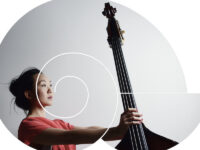by S. Victor Aaron
About six weeks ago we saluted some amazing young women who stand poised to make a lot of noise in the man’s world of jazz instrumentalists. One of those is releasing her debut album on this very day, a unique bass player who goes by the compact name of Linda Oh.
Oh was born in Malaysia to parents of Chinese descent, but was reared in the Perth, Australia area. As a child, she learned piano and picked up a variety of woodwind instruments, but gravitated to electric bass in high school, and picked up an affinity for the music of Flea and The Red Hot Chili Peppers. It wasn’t until she attended the Western Australia Academy of Performing Arts that she started taking lessons for the double-bass. Racking up scholarships and degrees while becoming the best up and coming Australian bassist on the other side of the Outback, Oh moved to NYC to earn a Masters in Music at the illustrious Manhattan School of Music, and picked up the ASCAP Young Jazz Composers Award for 2008. While she completes her studies, she plays in clubs around town and works with jazz luminaries like Billy Childs, Slide Hampton, Bill Kilson and Thomas Barber’s Janus Bloc (more on Barber in an upcoming article).
Linda Oh had also been putting together her first record, Entry, and today for the first time the world at large gets to hear her own conception of sound.
Give Oh a lot of credit for the uncommon approach she’s taken for her first album; Entry isn’t the smorgasbord of technique and styles that she could have easily made this. “So many musicians want to do everything with their first album,” Oh says. “Especially bass players who play upright and electric…I wanted to steer completely clear of that and have something kind of raw as well as challenging. Basically, I knew I wanted to do something different.” The maturity beyond her years with her words are borne out in her music.
Employing an unconventional trio of drums by Obed Calvaire and trumpet from Ambrose Akinmusire, and all songs but a Chili Peppers cover were written by the leader, Oh sets up the greater challenge of introducing her own completely individual expression right out of the gate. With no guitar or piano or the like, chords are not played but implied, and there’s much space to fill by such little in the way of sonic thickness. Oh and Akinmusire manage, though, by regularly swapping melody and harmony roles, as well solo and accompanist roles. Oh’s choice for a trumpet as a foil service to balance the tonality of the sound: a sharp, brassy instrument that balances out her low frequency, pulsing one. For her part, Oh sticks with a stand-up bass exclusively.
From this lean configuration, Oh and her cohorts bring forth her songs, which follow a pattern of dark overtones, but with some definition, resonance, and some change-ups in both the melody and rhythms. With a four-note repeating figure introduced by Oh, “Morning Sunset” is some related fragments strung together logically with some powerful bass lines and Calvaire straining to burst out of the timekeeping. Akinmusire smartly solos casually, as the other two are carrying much of the weight already. When Oh solos, she is still holding together the harmony intact. It’s the mark of a player who plays with a preference for showing off her chops with intelligence over flash.
On “Patterns”, Oh shows a lot of ability to make her notes resonate and complement Akinmusire, as the two coaxes out an interesting melody. Calvaire’s increasingly urgent percussional shadings gives the song the just right final element to this tune. After a solemn false intro, “Numero Uno” plunges right into a quickened pace that Calvaire just thrives on, and Oh is grooving with an insistent bass line. From the other selections, “Fourth Limb” finds Oh reaching for the higher registers of her bass. “Gunners” contains an ostinato for a theme that is revisited after numerous trips to nearly-free sections of abrupt changes and tricking harmonic lines. “A Year From Now” reveals a more ruminative side to Oh, and she subtly modulates the mood like a master. That RHCP tune, the gentle, soulful number “Soul To Squeeze,” give us a glimpse into Oh’s interpretive skills. She follows Flea’s familiar bass pattern for the song for the most part, but ventures outside of it to provide some well-placed accents, enough to make it her own without losing track of the melody.
As one of the ten young ladies I singled out as the Young Lionesses to watch out for, everyone can now hear what I’ve been talkin’ about all this time. Entry is a singular voice from the far side from Oz offering music that’s otherworldly for such a fresh talent. We should be hearing much more from Ms. Oh for a long time to come.
Visit Linda Oh’s website here.
- Claudio Scolari Project – ‘Opera 8’ (2024) - April 25, 2024
- Nick Millevoi – ‘Moon Pulses’ (2024) - April 23, 2024
- Cannonball Adderley – ‘Poppin’ in Paris: Live at L’Olympia 1972′ (2024) - April 20, 2024




